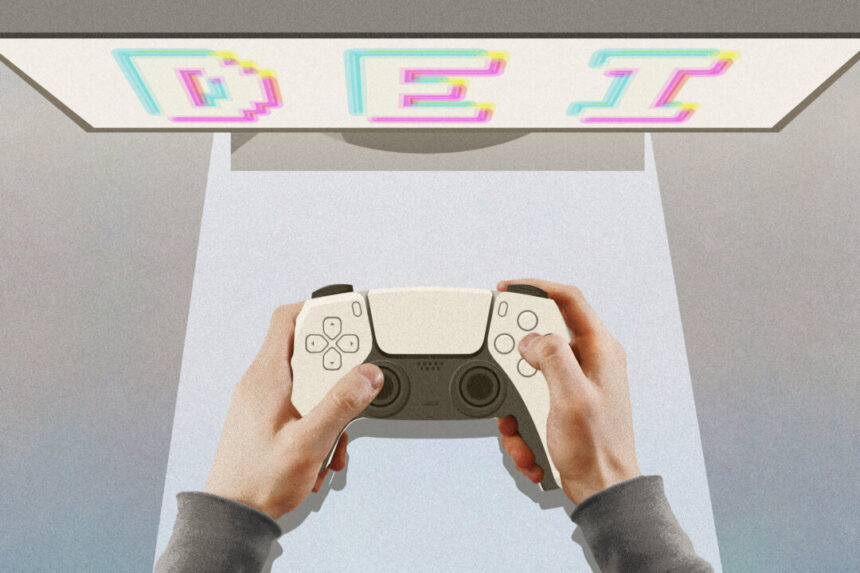BioWare, the developer behind the popular Mass Effect and Dragon Age video game series, is facing a new challenge.
After the disappointing launches of two expensive triple-A titles, the studio was hoping for a win. Their latest offering is the fourth installment in the Dragon Age series, with the previous game released a decade ago.
Initial reactions to trailers for Dragon Age: The Veilguard were negative, with longtime fans criticizing the new game’s softer, stylized art style, likening it to a Disney-Pixar movie.
However, after BioWare invited streamers and critics to a private demo of the game, those who experienced Veilguard firsthand were more positive and encouraged fans to wait for the full release.
Shortly before its release, leaked clips of Veilguard revealed the game’s inclusion of transgender themes and diversity, equity, and inclusion (DEI) messaging.
One scene depicted a character doing pushups as penance for using incorrect pronouns, emphasizing the importance of respecting gender identity.
Another scene featured a character coming out as nonbinary to their parents in a high fantasy setting.
The game’s character customization system allowed for mastectomy scars but not curvy female characters.
Laura Kate Dale, a queer representation critic and consultant, shared her involvement in the project on social media.
Corinne Busche, the game director of Veilguard, is transgender and expressed the team’s goal of creating a safe space for the LGBT community through their games.
Despite previous Dragon Age titles featuring LGBT characters, Veilguard’s approach to representation sparked mixed reactions.
Critics’ Reviews
While initial fan reactions were varied, early critic reviews for Veilguard were mostly positive.
IGN, known for its critical scoring, gave Veilguard a high rating, although an alternate review was released after it was revealed that the critic was transgender.
Some critics were less enthusiastic about the game’s tone and gameplay mechanics, leading to a discrepancy between professional reviews and consumer feedback.
Costly Business
Triple-A game development comes with high risks and costs, as shown by Veilguard’s performance in the market.
Official sales figures for Veilguard have not been disclosed, but the game’s reception among players and concurrent player numbers on platforms like STEAM indicate mixed results.
Compared to other recent game releases, Veilguard’s sales figures may not meet the studio’s expectations, considering the significant development costs.
While the game received positive reviews from critics, its sales numbers and player feedback paint a different picture of its success in the market.
Embracer is the proud owner of the Tomb Raider game franchise.
“We just want to do some glory kills and get the heart rate up a little. For me that is what games should be about,” Karch added.

Visitors play the Space Marine video game during a preview of the Paris Games Week on Oct. 22, 2024. Dimitar Dilkoff/AFP via Getty Images
Noticing the Agenda
The popular franchise The Last of Us, recently made into an HBO series, was a tale about a young girl—and the grizzled man who protects her fighting to survive a sort of zombie apocalypse.
The sequel, The Last of Us 2, sold well enough, but some fans were confused by the decision to make the main character a lesbian who turns her nose up at “bigot sandwiches.”
Players also panned a lengthy section of the game that requires them to go on a killing spree as the heavily muscled transgender “Abby.”
Gamers began to question: Who is asking for this content, and why does it keep popping up?
A Brazilian player, who goes by the online name Kabrutus Rambo, took note of the recurring pattern of “woke” and “virtue-signaling” messaging in games, and found a common denominator: consulting firms hired to make games less “problematic.”
Those firms include agencies such as Sweet Baby Inc. (SBI), which bills itself as a “narrative consultancy.”
SBI has consulted on some of the most popular game franchises of recent years, including Spider-Man 2, Alan Wake 2, and God of War: Ragnarök.
God of War did especially well, raking in handfuls of technical, acting, and story awards, along with two “Game of the Year” wins.
It also raised eyebrows when it depicted Angrboda, a character from Norse Mythology, as a young black woman.

Fans try a Playstation 4 game at the E3 Gaming and Technology Conference at the Los Angeles Convention Center on June 11, 2013. Alberto E. Rodriguez/Getty Images
Kabrutus Strikes Back
In response to his discovery that consulting firms were involved, Kabrutus curated a page on STEAM called “Sweet Baby Inc. Detected.” It contained a list of every game that he could confirm had hired SBI as consultants.
During an interview with Twitch streamer Asmongold, Kabrutus said he wanted to draw attention to the fact that video games were being used for political purposes.
“Diversity in games isn’t a bad thing at all you know, when it’s done properly … the thing is they politicize stuff,” he said.
In an email to The Epoch Times, Kabrutus said he tried to play Veilguard for review purposes, but was unable to finish, citing the boring combat scenes and “cringe” dialogue.
“When they focus so much into inserting a specific political agenda into the game it certainly affects its overall quality. The combat will likely be less interesting and the story will probably end up having tons of propaganda,” he said.

A Playstation console and video games are displayed in a Best Buy store in San Francisco on Feb. 27, 2024. Justin Sullivan/Getty Images
Kabrutus has launched a website called “DEI-detected” that looks to inform gamers before they spend their cash on games filled with such messaging.
“If they REALLY wanna make a game that talks about progressive ideas, do it in a new franchise and try to grow an audience of their own instead of trying to hijack the audience from another well established franchise,” he said.
 Source link
Source link






